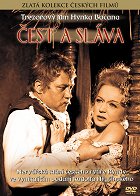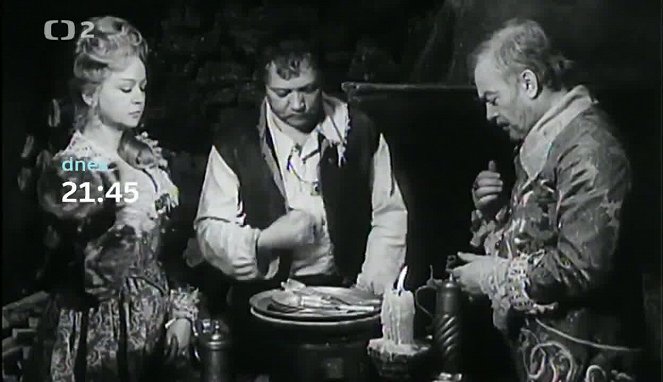Rendező:
Hynek BočanOperatőr:
Jiří ŠámalZeneszerző:
Zdeněk LiškaSzereplők:
Rudolf Hrušínský, Blanka Bohdanová, Karel Höger, Iva Janžurová, Josef Kemr, Lubomír Lipský st., Bohuslav Čáp, Jaromír Hanzlík, Hana Kreihanslová (több)Tartalmak(1)
It is the year 1647 and the war has been raging for almost thirty years. Poor and dilapidated is the stronghold of the knight Václav Rynda of Loučka and so is his clothing. The family property was spent by his father who, after the loss at the battle at the White Mountain, was forced to give up his faith and had to swear submission to the Catholic Church to save his skin. Václav resembles a peasant rather than a nobleman, as he tries to find something to eat for himself and his domestics. One day, a visit comes to the stronghold. The emperor's commissioner Šrandorf and his wife ask for a night's lodging. The guest then reveals to Rynda in private that Šrandorf is not their real name and that in fact they are not even married - Jindřich Donovalský and his companion Kateřina have come in the French king's employ and want to incite a revolt against the Hapsburgs in Bohemia. That very night, a gang of marauders attacks the stronghold and the guest helps the defenders of the stronghold to put them to flight. Donovalský wants to persuade the diligent Rynda to join the resistance and remains as a guest with his company for many months. His false commissioner's letter of safe-conduct saves Rynda in winter from the requisition by the emperor's army. In the meantime, Donovalský's adjutant trains Rynda's subjects in fighting. During the collection of tithes, a parish priest is unfortunately killed and the accident instigates open resistance. Rynda recalls his own roots and stands at the head of the rebellion although the news that the war is over has just arrived. (forgalmazó hivatalos szövege)
(több)Recenziók (3)
Today’s filmmakers could use this movie as an example of how to shoot a great historical story. All you need is a couple of stage props (we’ve got plenty of those), every now and then some honest dialogues that don’t spare some honest foul language that could be heard in a dive bar and Rudolf Hrušínský, who radiated fear and respect as if he was some arch-demon. I didn’t feel well watching this. Quite the contrary. I literally felt sick. And it was not only due to the quality of the actors, but also of the score that put me into such moods that few historical movies could. I tip my hat off. The only pity is that you really have to follow all the details carefully if you don’t want to get lost in the story. But it’s definitely not an easy watch.
()
Unjustly overlooked film, one of the fruits of the liberated creative atmosphere of the late 60s. The strength lies in the dialogues and the concise length of the film. A stellar performance by three great personalities - Höger, Hrušínský, and Bohdanová. History portrayed without embellishments, nationalist and revivalist myths. Just a pity that the film is not in color. Overall impression 90%.
()
The depressing opening credits, which radiate period atmosphere, and one, by the standards of the time, almost indiscriminately violent action scene are undoubtedly among the highlights of Czechoslovak cinema, but they are in mad formal contrast to the rest of the film, which is nothing but a sequence of more or less interesting dialogues and eccentric acting creations. Not that I'm complaining, Hrušínský, Kemr and Höger are excellent, but the emotional flatness and rather shallow plot didn't allow me to truly enjoy the film, only to survive it quite comfortably and without consequences; and that’s not why I watched it. 65%
()

